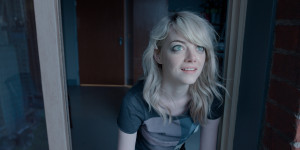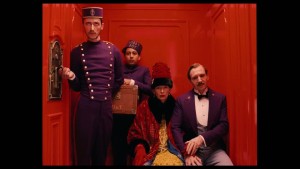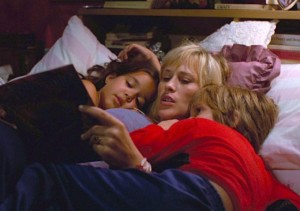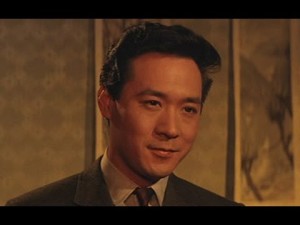


Why am I handicapping the Oscars yet again? Because I still can’t afford to buy live ammo, live trout and a barrel thick enough to withstand the former and big enough to carry the latter.
That’s how easy this game is, despite mass media’s insistence on playing it over and over and over, year after year after bloody year. It’s gotten so that even when there’s the prospect of suspense, as there was a year ago, the evening itself ends up being about as suspenseful as a congressional Electoral College vote. Even the things I was wrong about last year, didn’t surprise me; notably “12 Years a Slave” winning Best Picture, though I was mildly surprised to have been right about its screenwriter, John Ridley, winning one.
Anyway, since I think this year’s crop is even easier to forecast than usual, I’m going to do to try making things interesting (at least, for me) by adding a For Whatever It’s Worth (FWIW) section beneath sundry categories. Mostly, I’m going to suggest missing contenders. Otherwise it’ll just be whatever pops into my jejune lil’ head.
Oh, and my projected winners, as usual, are in bold.
Best Picture
American Sniper
Birdman
Boyhood
The Grand Budapest Hotel
The Imitation Game
Selma
The Theory of Everything
Whiplash
Boyhood seemed ahead by many lengths at the start of this season; not so much, now, even though some still believe its BAFTA prize keeps it in the game. They’re wrong – and this says as much as (and far better than) I could as to why this is now a foregone conclusion. The only thing I might add to Mark’s diagnosis is that Hollywood narcissism is as much a device for denial as it is for self-congratulation. Editors and pundits, especially those who have no idea what movies are about, believe that controversy and buzz are all a movie needs to become anointed Best Picture. You’d think that, by now, they’d know that’s the LAST thing the Academy Awards want unless – and only unless – they can somehow exalt themselves by recognizing the controversy and embracing it. But all the money American Sniper‘s raking in isn’t going to make these people any braver about such things. Not in this century, folk. At least not yet.
FWIW – Overall, a good-but-not-great list appropriate for a good-but-not-great year. Only Lovers Left Alive, for those who keep asking, was my number one movie of last year and, similar to what one of its characters says about Detroit (where it’s set), it is the one 2014 movie I think is best equipped to endure and ultimately prevail through 2064.
Best Director
Alejandro Innaritu, Birdman
Richard Linklater, Boyhood
Bennett Miller, Foxcatcher
Wes Anderson, The Grand Budapest Hotel
Morten Tyldum, The Imitation Game
For reasons already mentioned, I’m less sure about this one than I was several months ago, though Best Picture/Best Director splits have at least since the century’s turn gone from being a rarity to a semi-regular occurrence. Innaritu’s winning the DGA prize boosts his standing, though it doesn’t necessarily make him inevitable. I’m still inclined towards Linklater because just his investment of time and effort is too impressive to ignore, no matter how you may feel about the result.
FWIW – The omission of Selma’s Ava DuVernay from this category caused an outcry of such breadth that it came across like the pop-cultural equivalent of Ferguson/”I Can’t Breathe.” In terms of racial profiling (as in raising of profiles as opposed to diminishing races), I don’t think things are as bad in Hollywood as they once were, say, fifty, thirty, even ten years ago. But as this shortsightedness proves, they could still be a lot better. And the movies better recognize that on this and many other matters, TV is way out in front. The Unbearable Whiteness of this year’s Oscars will, I think, end up as an anomaly, but can we talk sometime about Dear White People’s complete absence, too?
Best Actor
Steve Carell, Foxcatcher
Bradley Cooper, American Sniper
Benedict Cumberbatch, The Imitation Game
Michael Keaton, Birdman
Eddie Redmayne, The Theory of Everything
It’s essentially a race between the last two names on this list and as impressed as Hollywood can be with actors who go through the kind of physical transformations Redmayne does here, it’s the larger, deeper transformations embedded in Keaton’s weathered visage that will make more of a difference with voters.
FWIW – Lots of MIAs here; notably Timothy Spall in the title role of Mr. Turner and Ralph Fiennes’ embattled concierge of The Grand Budapest Hotel. The first is something you’ve never seen before while the second is a polished exemplar of Mannered Screwball reminiscent of movies made in the decade its movie purports to chronicle. Though Philip Seymour Hoffman wouldn’t have won for A Most Wanted Man, a posthumous nomination would have been a nice gesture. And while I wasn’t a huge fan of Gone Girl, I was sure Ben Affleck’s wry, limber rendering of sad sap Nick Dunne would get a nomination, especially given his previous snub for a Best Director nod two years back for Argo. He wouldn’t have won here either. But his absence points to the kind of harder-than-it-looks acting style that the Academy routinely overlooks in favor of the Big Bravura Effect.
Best Actress
Marion Cotillard, Two Days, One Night
Felicity Jones, The Theory of Everything
Julianne Moore, Still Alice
Rosamund Pike, Gone Girl
Reese Witherspoon, Wild
Done deal. And she deserves it…
FWIW – …but Cotillard, the most compelling film actress in the world, deserves it more for a performance that is (once again) too subtle and contained to satisfy the Academy’s inclination towards the aforementioned Big Bravura Effect (hereafter known as BBE). Here’s a little irony to put in your tea: Seven years ago, Cotillard’s grand, eerily detailed rendering of Edith Piaf in La Vie en Rose won this award over the favored Julie Christie, whose performance as an Alzheimer victim in Away From Her that year was a much rawer depiction of the disease’s ravages than Moore’s, which, as noted, has unsettling graces of its own.
Best Supporting Actor
Robert Duvall, The Judge
Ethan Hawke, Boyhood
Edward Norton, Birdman
Mark Ruffalo, Foxcatcher
J.K. Simmons, Whiplash
As with Christopher Plummer a couple years back, he’s so inevitable that he’s already sweeping up the foam packing peanuts that came with the statuette’s advance delivery to his home. But as long as we’re here, let’s idly speculate. What if Simmons’ performance had been placed where it properly belongs: In the lead actor category? Would he have been as decisive a shoo-in as he is here? Let’s go even crazier. Since Denzel Washington is the only living actor who could have matched Simmons volt for volt in this role, would HE have been given a lead actor nod because of his relative professional standing? Or would he have likewise been nominated for supporting actor? Keep in mind that my comparison with Denzel doesn’t shortchange but, if anything, amplifies the dimensions of Simmons’ work here and I can only hope that the good vibes continue for him well beyond awards season.
FWIW – Some people consider Norton the runner-up while I think Hawke’s work in Boyhood is every bit as committed and resonant as that of the woman who’s a lock for Best Supporting Actress. (See below.) The guy who got screwed here is Josh Brolin, whose gonzo LAPD cop in Inherent Vice, was inspired, magnetic daffy-duckiness.
Best Supporting Actress
Patricia Arquette, Boyhood
Laura Dern, Wild
Keira Knightley, The Imitation Game
Emma Stone, Birdman
Meryl Streep, Into the Woods
As with Moore and Simmons, it’s hard to imagine a scenario where this doesn’t happen. And Arquette’s pitch-perfect evocation of a smart, decent woman seemingly condemned to making foolish choices in life partners stood out in her movie even more than its twilit reveries.
FWIW – I’ve already mentioned Affleck’s understated comedic turn in Gone Girl, whose one great performance belonged to Carrie Coon. As Nick’s sister, she was the beating, breaking heart of that movie. She didn’t get a nomination, but she’s now got my attention, and deserves yours.
Best Adapted Screenplay
American Sniper
The Imitation Game
Inherent Vice
The Theory of Everything
Whiplash
I could imagine any of these walking away with the statuette, but I can’t imagine Harvey Weinstein’s typically robust campaign on behalf of his leading entry coming away from this thing empty-handed.
FWIW – Any script that would even try to adapt a Thomas Pynchon novel for the screen, even one as relatively accessible as Inherent Vice, is worthy of a party favor, even if the result bemused as many people as it amused.
Best Original Screenplay
Birdman
Boyhood
Foxcatcher
The Grand Budapest Hotel
Nightcrawler
Birdman is Wes Anderson’s only worry here. That’s more of a director’s movie. Which is to say Wes Anderson has nothing to worry about.
FWIW – There were some who believed Whiplash belonged here and would have won easily if it had been in its rightful category. Simply put, yes and no.
Best Animated Feature
Big Hero 6
The Boxtrolls
How to Train Your Dragon 2
Song of the Sea
The Tale of Princess Kaguya
This has already won an “Annie” in this category and nothing else here seems to have the legs to beat it.
FWIW – Always easier to handicap when Pixar has an entry. Except they don’t this year. (Whaaaat?)
Best Documentary Feature
Citizenfour
Finding Vivian Maier
Last Days in Vietnam
The Salt of the Earth
Virunga
You ignore currency and/or vitality in this category at your peril, as recent winners have proved. Nothing else in this year’s group has both in such quantity.
FWIW – Still, I was beguiled by Vivian Maier’s one-of-a-kind story and wish there was still room for such quirky, gnomish movies to finish with the gold. We – most of us, anyway – don’t live in a quirky, gnomish world.
Best Foreign Language Film
Ida
Leviathan
Tangerines
Timbuktu
Wild Tales
Ida has swept most of the critics’ awards and will likely continue its run here. It’s an austere, beautiful piece that mostly lives up to its hype.
FWIW – But, I dunno, I preferred Leviathan’s overall weight and power; the kind that usually mugs austerity in Oscar’s back alleys. Wouldn’t be an upset if it won here.
Best Cinematography
Birdman
The Grand Budapest Hotel
Ida
Mr. Turner
Unbroken
Any of these would be a legitimate winner, but I’m guessing the voters will prefer the one that makes sure you can see an almost-naked man walking through Times Square.
FWIW – Mr. Turner, Mr. Turner, Mr. Turner, Mr. Turner, Mr Turner (If I say it often enough, will they come to their senses? I’m pressing on, anyway!), Mr. Turner, Mr. Turner…..
Best Original Score
The Grand Budapest Hotel
The Imitation Game
Interstellar
Mr. Turner
The Theory of Everything
Alexandre Desplat finally wins one. But for which one? Competing against yourself in the same category seems a formula for canceling yourself out. But Budapest’s music is far more striking than Imitation Game. So Desplat beats Desplat here by a length.
FWIW – I, too, would have liked seeing Antonio Sanchez’s trap-set dynamics for Birdman in this group. But there’s no way Hollywood tradespeople give props to a lone musician inventing a score as he goes along. The Oscars go to…people who help make more work (and money) for everybody in the industry, whether in ensembles or orchestras.
Best Original Song
“Everything is Awesome,” The Lego Movie
“Glory,” Selma
“Grateful,” Beyond the Lights
“I’m Not Going to Miss You,” Glen Campbell: I’ll Be Me
“Lost Stars,” Begin Again
No one, not Joe Califano, not Harvey Weinstein, not Maureen Dowd, is going to stand in this one’s way…
FWIW — …though “Everything is Awesome” may yet become the anthem of the next collectivist revolution. (As if.)

So I watched The Maltese Falcon yesterday afternoon, partly in celebration of John Huston’s birthday, partly because I hadn’t seen it in a while. Its stock has risen and fallen with me over the decades, though never TOO low (or as low as it often fell with hard-core auteurists). Now I’m all grown-up and unequivocally accept it as a classic. But this time around, as I was watching Humphrey Bogart making his way from his office to his apartment and back again, I wasn’t thinking about him so much as I was thinking of Philip Seymour Hoffman’s star turn in A Most Wanted Man. And I realized, finally, why so many people who saw that movie are feeling even more desolated by Hoffman’s passing earlier this year.
Some perspective: Before Falcon, Bogart had been known primarily as a character actor specializing in bad-guy roles; most of them variations of Duke Mantee, the sneering fugitive killer from The Petrified Forest that established his name on stage and screen. As Sam Spade, Bogart carried some of the sinister aura he’d patented in his previous movies and was able to channel it into what Pauline Kael aptly described as an “ambiguous mixture of avarice and honor, sexuality and fear.” It was Bogart’s first “good-guy” role, though given Spade’s icy duplicity and casual cruelty one could more properly characterize it as anti-heroic, or “bad-good guy”. Nevertheless, the movie’s success made Warner Brothers and, by extension, the public regard this brooding, battered-looking fellow as someone who could be a romantic figure; a conflicted one at times, perhaps, but an enviably tough one for sure.
Philip Seymour Hoffman’s situation before Most Wanted Man was quite different from Bogart’s before Maltese Falcon. By the time he’d died of a heroin overdose this past February, Hoffman was regarded as one of our finest actors, perhaps, the greatest of his generation. His versatility won him acclaim, awards and a kind of stardom that hadn’t yet translated to heroic or romantic leads; mostly, he was cast as eccentric, sweet, awkward or malevolent characters. If Kael’s description of Bogart’s Spade could have been applied to any of Hoffman’s roles, it likely would have been Lancaster Dodd, the mercurial cult leader and title character of 2012’s The Master. It’s probable that after playing a such a magnetic composite of eccentricity, sweetness, awkwardness and malevolence Hoffman may have started wondering where else he could carry this trick bag and to what end.
So he began trying on some different wardrobe; first as a working-class mensch in God’s Pocket and as Most Wanted Man’s Gunther Bachmann, the rumpled German intelligence operative struggling to finesse the capture of a Muslim statesman suspected of funneling money to terrorists. Gunther is very much in the tradition of John Le Carre’s seedy spymasters; as with George Smiley, Gunther’s idea of getting results is to dig deep, stalk the edges, probe for soft spots and extract information as deftly as possible with no whistles and horns in sight. The strain of maintaining Gunther’s professional integrity shows in the way he wearily saunters into cafes and meeting rooms. Those working with or against Gunther’s tactics seem to have the edge because of their greater physical definition. Yet Gunther’s wooliness is deceptive, calculatedly so. Hoffman carries his character’s authority with a bruised, but stolid Old World dignity. You understand why his team will follow him everywhere and anywhere he takes them – and why his reluctant recruits end up trusting him despite their most urgent reservations.
As for the romantic part, there’s a moment, only a moment, where the possibilities make themselves apparent. It comes when Gunther, in an attempt to conceal his presence from somebody on an illuminated nighttime street, grabs his subordinate Irma (Nina Hoss) and embraces her in a faux-make-out clinch. When they break off, Irma’s hand lingers gently on Gunther’s back. The moment passes, but it’s one of the few times in director Anton Corbijn’s thriller where you’re aware of something going on just beyond the narrative’s whirring machinery.
You’re also aware of something happening with Hoffman’s screen image beyond his already-legendary chameleon chops. You think of the possibilities opened up by having someone as unkempt as a fraternity hall closet after a beer party somehow embody an heroic archetype that movie audiences throughout the world could embrace as cozily as Irma does Gunther. I’m not saying Hoffman’s performance in Most Wanted Man would have allowed him to pursue his own Casablanca or To Have and Have Not. But, putting it as painlessly as possible, it would have been great fun to see him go for it.

The recent death of James Shigeta at 85 evokes a different, but no less poignant sense of lost or forsaken possibilities. Shigeta, as many knowing and respectful tributes have mentioned, had a long and influential career as both dramatic actor and musical-comedy performer. Blessed with a deep, melodious speaking voice, Shigeta broke down racial barriers from the start of his career, playing a police detective in Samuel Fuller’s iconoclastic 1959 thriller, The Crimson Kimino, in which his character becomes romantically involved with Victoria Hall’s imperiled Caucasian witness.
It wouldn’t be the only time he’d played someone in an interracial romance or for that matter, someone in a romantic lead. And it seemed for a while as though his magnetism and grace would pay off in major stardom despite the compartments Hollywood still tended to place roles for Asian actors.
But Shigeta, though always in demand in movies and television, never became a major star; not even during a twenty-year span – the sixties and seventies – when the nature of what it meant to be a movie star was expanding enough to encompass the previously non-traditional likes of Sidney Poitier, Barbra Streisand and Dustin Hoffman. Maybe the movies couldn’t do it, but television was, and is, a different proposition, more open to tweaking expectations in the name of getting attention – and ratings.
Knowing Shigeta was originally from Hawaii made me imagine a bit of alternative history that, had it actually come to pass, might have helped make a different world. It certainly would have made for an obituary different from the ones widely circulated late last month.
So let’s all imagine, shall we?
LOS ANGELES, July 29, 2014 – James Shigeta, the groundbreaking Asian-American leading man, who achieved his greatest success as star of the long-running CBS police series, “Hawaii Five-O”, died Monday of pulmonary failure. He was 85.
Shigeta, born in what was then the Hawaii territory of the United States to Asian American parents, achieved early success as both a movie actor and as a singer who performed in the 1960 film adaptation of “Flower Drum Song,” the Rodgers-and-Hammerstein musical comedy about arranged marriages among Chinese-Americans.
But it was the role of Detective Lt. Rick Nakamura on “Hawaii Five-O” that made Shigeta a household name in America and throughout the world. In the process, it accelerated the broadening presence of non-white actors on the big and small screens in roles that traditionally went to whites.
“I will always be grateful to Rick Nakamura and everything he gave to me,” Shigeta said in later years. “Once you’ve done TV for as long as I have, you’re never a stranger, no matter where you go in the world.”
It very nearly didn’t happen, according to the late Leonard Freeman, who created and produced “Hawaii Five-O.” Back in 1967, when the idea for a series about an elite crime-fighting unit based in Honolulu reached the development stage, Freeman recalls that while casting Asian actors as cast regulars was never in doubt, the notion of the team’s leader being Asian met with resistance from CBS executives.
“They were adamant,” Freeman recalled in 1971 when the series was in its third season. “But I kept at it, telling them that, after all, we were in a time when Bill Cosby was winning Emmys as a lead character on ‘I Spy.’ But the network was certain that people weren’t ready for an Asian cop leading a series. I kept telling them that just the curiosity of the idea, along with all that beautiful scenery, would give them everything they wanted.”
Shigeta, who jumped at the chance for steady work in the land of his birth, made his own pitch to CBS executives. Apparently that was all it took – and the rest was television history, though, as Shigeta recalled later, it took a while for the show and his stardom to take hold.
“An Asian leading man on prime-time television wasn’t exactly business as usual in 1968,” he told a Time magazine interviewer in 1975. “In fact, there were so many people [at CBS] who were so sure it wouldn’t take that they were already talking about midseason replacements the same m0nth we went on the air. I got so depressed by the low expectations that by season’s end, I’d prepare for the hammer to fall and I’d start trying to figure out what to do with my life afterwards.
“Then we got renewed. But we carried those same low expectations into season two, even with all the awards we were getting. And I’d get that same sinking feeling.. Seven years later, we’re still around, so I guess everybody’s stopped worrying.”
Eventually, “Hawaii Five-O” ran twelve seasons, from 1968 to 1980. Shigeta’s good looks, silkily resonant voice and ramrod presence allowed Rick Nakamura to become as familiar to TV viewers as James Arness’ Matt Dillon from CBS’ comparably durable “Gunsmoke.” Backed by a supporting cast that included James MacArthur, Kam Fong and Gilbert Lani Kahui , whose professional name was Zulu, Shigeta’s Nakamura conveyed a deceptively impassive demeanor magnetic enough to establish what TV critic Ken Tucker would later characterize as a “paradigm of absolute cool” that actors of all nationalities would try duplicating with mixed results.
What helped seal Nakamura’s immortality was the way Shigeta would reliably intone, at or near the end of each episode, “Book ‘em, Dann-O!” to MacArthur’s Danny Williams with icy resolve.
Shigeta was nominated for Emmys six times, winning for Best Lead Actor in a Dramatic Series in 1969, 1970 and 1973. Once the show achieved steady success, Shigeta used his growing influence to ensure that other non-white actors would be given roles that would not be denigrating . He especially made sure that all his co-stars received extensive screen time, even their own episodes. MacArthur won a Best Supporting Actor Emmy in 1971 and Kahui and Fong credit their exposure on “Hawaii Five-O” for securing roles in major motion pictures, including 1988’s “Die Hard” in which they played Asian businessmen who sacrifice their lives for hostages.
MacArthur, in accepting his Emmy, credited Shigeta for the collegial atmosphere he helped sustain throughout the show’s run. “A great actor without a big ego. He’s a freak of nature!”
Shigeta parlayed his TV notoriety into a modestly successful career as a nightclub singer and recording artist. He was always puckishly proud that his 1971 version of Rod McKuen’s “Cycles” beat out Frank Sinatra’s 1968 version by reaching number 15 on the Billboard pop charts. “Something else,” he noted wryly in the Time interview, “to thank Rick Nakamura for.” (For his part, Sinatra held no grudges against Shigeta’s coup, saying, “That’s what happens when you’ve been out-acted by a fine actor.”)
By 1974, Shigeta had acquired enough clout with both the show’s producers and the network to get them to agree to casting his “Flower Drum Song” co-star Nancy Kwan as a series semi-regular. Her role as enigmatic federal agent Joanna Ming was considered as much a groundbreaker in series television as Shigeta’s and in 1978 her character was “spun off” into her own CBS action series, “Undercover,” that lasted until 1981.
Shigeta recalled being exhausted by that last season of 1979-80 and took a six-year leave-of-absence from show business. Hawaii Democrats proposed that he run for governor in 1986. Though intrigued, Shigeta demurred, insisting that, however much he wanted to effect change for people-of-color, he could do the most good in his chosen profession. Instead, he agreed to ease back into the medium in a recurring role on “L.A. Law” as Judge Danforth Akiyoshi.
He admitted that it was “funny, at first” when actors on the series would insist on muttering, “Book ‘em, Dann-O” between takes. “I’d always tell them they didn’t quite have it right,” he said. “And they were always crestfallen when I did. Gosh, I didn’t think they’d take it so personally.””





